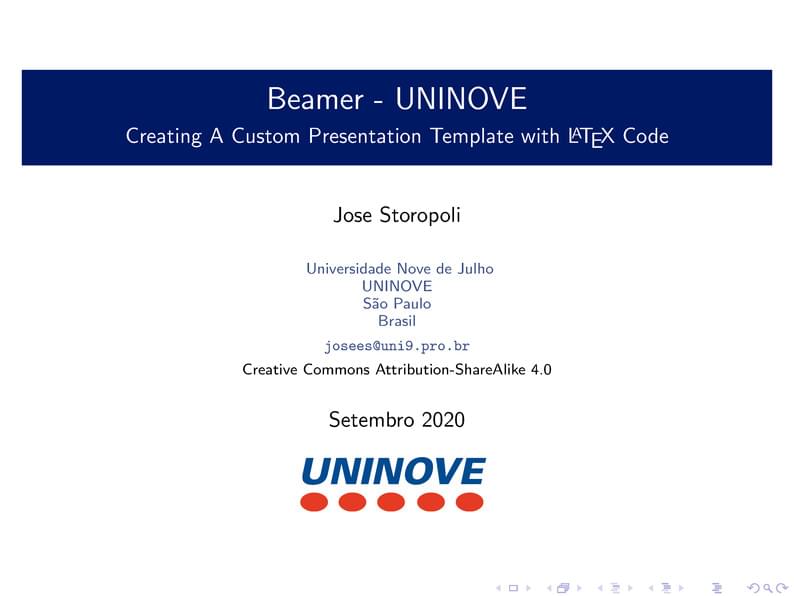
Beamer-UNINOVE
Author:
Jose Storopoli
Last Updated:
před 5 lety
License:
Creative Commons CC BY 4.0
Abstract:
A simple Beamer template for UNINOVE presentations.

\begin
Discover why over 25 million people worldwide trust Overleaf with their work.

\begin
Discover why over 25 million people worldwide trust Overleaf with their work.
%--- Preamble ---------------------------------------------------------%
% Load LaTeX packages
\documentclass[10pt, xcolor=dvipsnames]{beamer}
\usepackage[absolute, overlay]{textpos} % supports floating text in any location
\usepackage[utf8]{inputenc}
\usepackage{tikz}
\usepackage{csquotes,xpatch}% recommended
%\usepackage[english]{babel}
%\usepackage[american]{babel}
\usepackage[brazil]{babel}
\usepackage{hyperref}
\usepackage{graphicx}
\usepackage{tabularx}
\usepackage{booktabs}
% Customize theme attributes
\useoutertheme{infolines} % adds 3 box footer
\usetheme[height=7mm]{Rochester} % choose theme
\setbeamertemplate{blocks}[rounded][shadow=true] % rounded theorem box with shadow
\setbeamertemplate{caption}[numbered] % enable counting of tables/figures
% Define template colors
\definecolor{QPblue}{RGB}{0,25,100} % define QP blue using RGB code
\definecolor{QPgreen}{RGB}{0,153,110} % define QP green using RGB code
\setbeamercolor{title}{fg=white, bg=QPblue} % define title page box color
\setbeamercolor{frametitle}{fg=white, bg=QPblue} % define frame title color
\setbeamercolor{normal text}{fg=black} % define standard font color
\setbeamercolor{author in head/foot}{fg=QPblue, bg=QPblue!75} % define infoline 1st box color
\setbeamercolor{title in head/foot}{fg=QPblue, bg=QPblue!60} % define info line 2nd box color
\setbeamercolor{date in head/foot}{fg=QPblue, bg=QPblue!30} % define infoline 3rd box color
\setbeamercolor{block title}{fg=QPblue!50!QPgreen, bg=QPblue!30} % define theorem box title color
\setbeamercolor{block body}{fg=QPblue!50!QPgreen, bg=gray!10} % define theorem box body color
\setbeamercolor{local structure}{fg=QPblue!75} % define bullet and enumerate list colors
% Define global environments
\newenvironment{reference}[2]{ % define environment for footnotes
\begin{textblock*}{\textwidth}(#1, #2)
\tiny\it\bgroup\color{red!70!QPblue}}{\egroup\end{textblock*}}
% Define title page logo and project metadata
\titlegraphic{\includegraphics[width=3cm]{UNINOVE_LOGO.JPG}\hspace*{0cm}~
}
\title{Beamer - UNINOVE}
\subtitle{Creating A Custom Presentation Template with \LaTeX{} Code}
\author{Jose Storopoli}
\institute[Cidades Inteligentes e Sustentáveis]{
\textcolor{QPblue!75}{Universidade Nove de Julho \\
UNINOVE \\
São Paulo \\
Brasil \\ [1ex]
\texttt{josees@uni9.pro.br}} \\ [1ex]
Creative Commons Attribution-ShareAlike 4.0
}
\date{Setembro 2020}
\begin{document}
%--- Title Page -------------------------------------------------------%
\begin{frame}[plain]
\titlepage
\end{frame}
%--- Slide 1 ----------------------------------------------------------%
\begin{frame}{Bullets}
Here is a sample slide that shows what \emph{itemized} and \emph{enumerated} lists look:
\begin{columns}
\begin{column}{0.45\textwidth}
\begin{itemize}
\item itemized item 1
\item itemized item 2
\item itemized item 3
\end{itemize}
\end{column}
\begin{column}{0.45\textwidth}
\begin{enumerate}
\item enumerated item 1
\item enumerated item 2
\item enumerated item 3
\end{enumerate}
\end{column}
\end{columns}
~\\[2ex]
The sample code also defines 2 columns.
\end{frame}
%--- Slide 2 -------------------------------------------------------------%
\begin{frame}{Floating Text}
The \LaTeX{} package \texttt{textpos} makes it possible to put text objects in arbitrarily prescribed places.\\[2ex]
With floating text, you define the environment name, font size, type, and color.\\[2ex]
In this example, The \texttt{reference} environment is created to take two input arguments, which specify \texttt{x} and \texttt{y} text position.\\[2ex]
Slide coordinates are defined relative to the top left corner. A Beamer slide has dimensions 128mm by 98mm. Trial and error ensures the ad-hoc text lands where you want.\\[2ex]
Example below:
\begin{reference}{4mm}{75mm}
V. Jikov, S. Kozlov and O. Olenik, Homogenization of differential operators and integral functionals, Springer, 1994.
\end{reference}
\end{frame}
%--- End -------------------------------------------------------------%
\end{document}